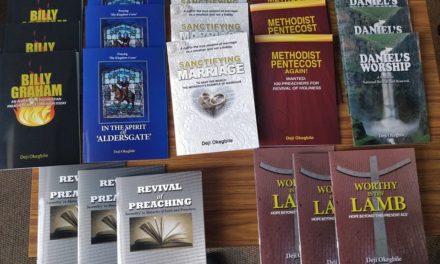The Gospel reading from Matthew chapter 3 about the baptism of Jesus is not only informing but a very transforming reflection for our personal and corporate renewal especially at the beginning of the New Year 2020. Jesus, in his baptism, his first action as adult established His identity and commission as God’s anointed agent, Christ, The Saviour, son of David and Abraham, Emmanuel (God with us). The baptism of Jesus mentioned in all four Gospels is about the sinless One submitting to baptism to fulfil all righteousness. Jesus came from Galilee to the Jordan to be baptised by John.
Galilee is where Jesus was accepted. Jesus spent most of his public ministry in Galilee. In Galilee, Jesus spoke their language, shared their country’s culture, knew their customs, and was comfortable. Jesus came from the culture, pleasure, and comfort of Galilee to Jordan of repentance. If Jesus, even without sin did it, you and I born in sin must do it. As church leaders, we all have our Galilee and it may be differ in Jesus’ context. I remember my childhood experience of Galilee every Easter Monday with the hope of meeting Jesus, we end up eating and drinking. To be baptised, cleanse and be use of God as a leaders, as a church, as a nation, and as preachers we need to come out of our Galilee of eating and drinking, Galilee of sin, Galilee of pride, Galilee of unbelief, and all the Galilee of our comfort zones and training. Apostle Paul, John Wesley and many other came out of their Galilee of philosophy and training and passed through their Jordan of repentance to be used as agent of renewal.
The Jordan River which is about 70 miles long has its main section stretching between the Sea of Galilee and the Dead Sea. Jerusalem lies about 20 miles west of it. It was by the River Jordan that the Israelite renewed their covenant with God before entering the Promised Land (Josh 1, 2). Most Christians’ first association with the river would be the scene of Jesus Christ being baptised by John the Baptist.
John the Baptist called people to change their behaviour, “Bring forth therefore fruits meet for repentance,” that is, “fruits that match repentance.” The question is, what distinguished John the Baptist from the Jewish religious leaders, especially the Pharisees and the Sadducee? John the Baptist was marked different from other religious leaders of his day who were greedy, hypocritical, selfish and preoccupied with winning the praise of the people. John the Baptist separated himself from the evil and hypocrisy of his day, ‘he lived differently from other people to show that his message was new. John the Baptist not only preached God’s law, he lived it.’ Jesus came to the one who practised what he preached. Jesus knew what John the Baptist believe and the way he lived.
John tried to deter him, saying, “I need to be baptised by you, and do you come to me?” Church leadership could deter membership repentance forgetting that all that glisters are not gold. John’s position resonates which the purpose of church leadership today in preparing the people for Jesus. There is a lot of leadership failure today in our inability and commitment to turn people to Jesus. We are in an age where leaders are increasing in size and in materials, and the church is decreasing whereas for John, Jesus must increase and he must decrease. God is calling the church leaders to put our ego, pride, and ‘profitable’ work aside in order to point others to Jesus. Without soul winning churches are are not sustainable just as without business activities are not sustainable. Leadership as renewal within empowers effective soul winning and discipleship. Leadership anointing is not by qualification or association but by consecration.
Indeed, ‘Jesus did not have any personal sin to repent of, but His washing with water may have signified the ritual washing of a priest when he is first consecrated. Jesus was anointed when the Holy Spirit came upon Him in the form of a dove, and God the Father accepted the Person of Jesus with a voice from heaven. This was the high point of John’s ministry.’ Jesus’ reply to John the Baptist is a warning to church leaders not to exempt or deter our members especially, certain influential members from the baptism of repentance. Status is not equal to salvation. Jesus replied, “Let it be so now; it is proper for us to do this to fulfil all righteousness.” The message is that, ‘one had to come out of Israel, be baptised, and then re-enter Israel.’
John consented to Jesus’ baptism and the unexpected happened. The Bible says, “As soon as Jesus was baptised, he went up out of the water. At that moment heaven was opened, and he saw the Spirit of God descending like a dove and alighting on him. And a voice from heaven said, “This is my Son, whom I love; with him I am well pleased” (vs 16-17). The climax of the scene is not the baptism itself but the vision and audition Jesus encounters as he comes up from the water. God confirms Jesus’ identity and commitment by sending the empowering Spirit and declaring Jesus’ identity. Baptism of repentance confirms our Christian identity as well as our leadership commitment through the empowerment of the Holy Spirit. God reciprocates missional expression of commitment just as Jesus, Apostle Paul, John Wesley and others were equipped for ministry and leadership. Ministry or leadership that is Galilee based and shaped without the experience of River Jordan, baptism of repentance lacks open heavens and a way of life that expresses genuine commitment to God hence, a liability to the church and people.










Recent Comments